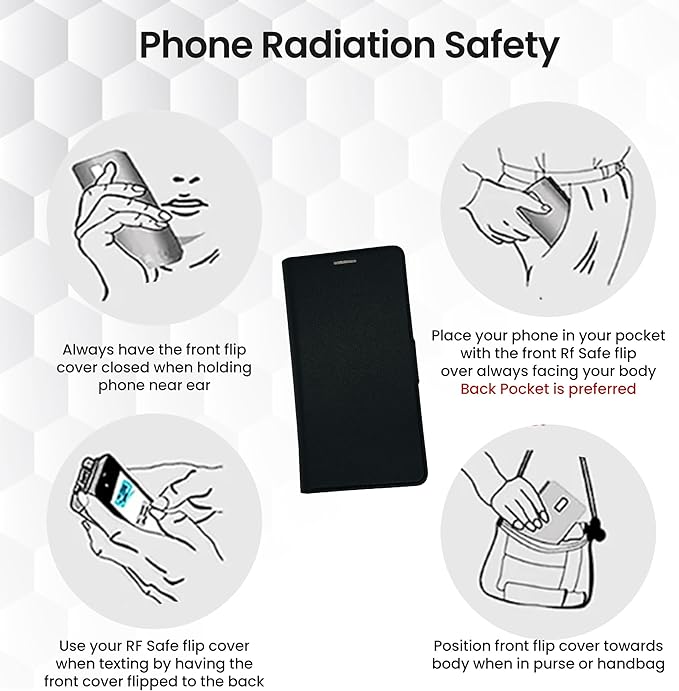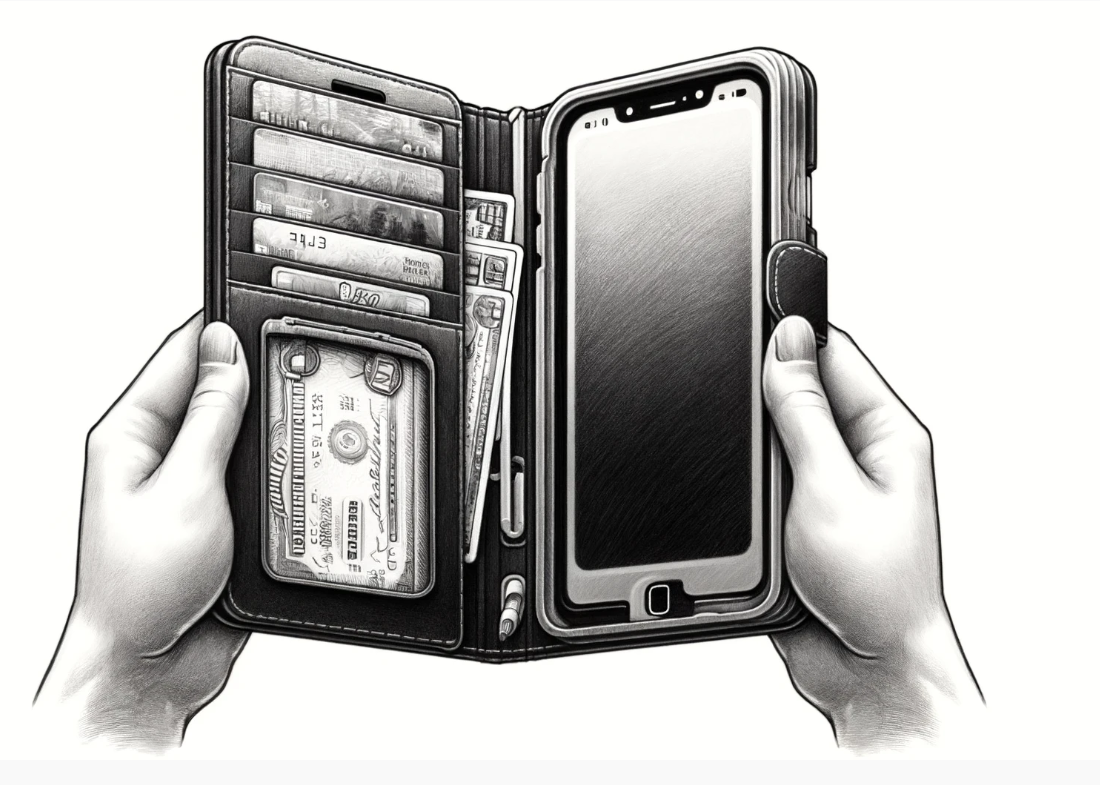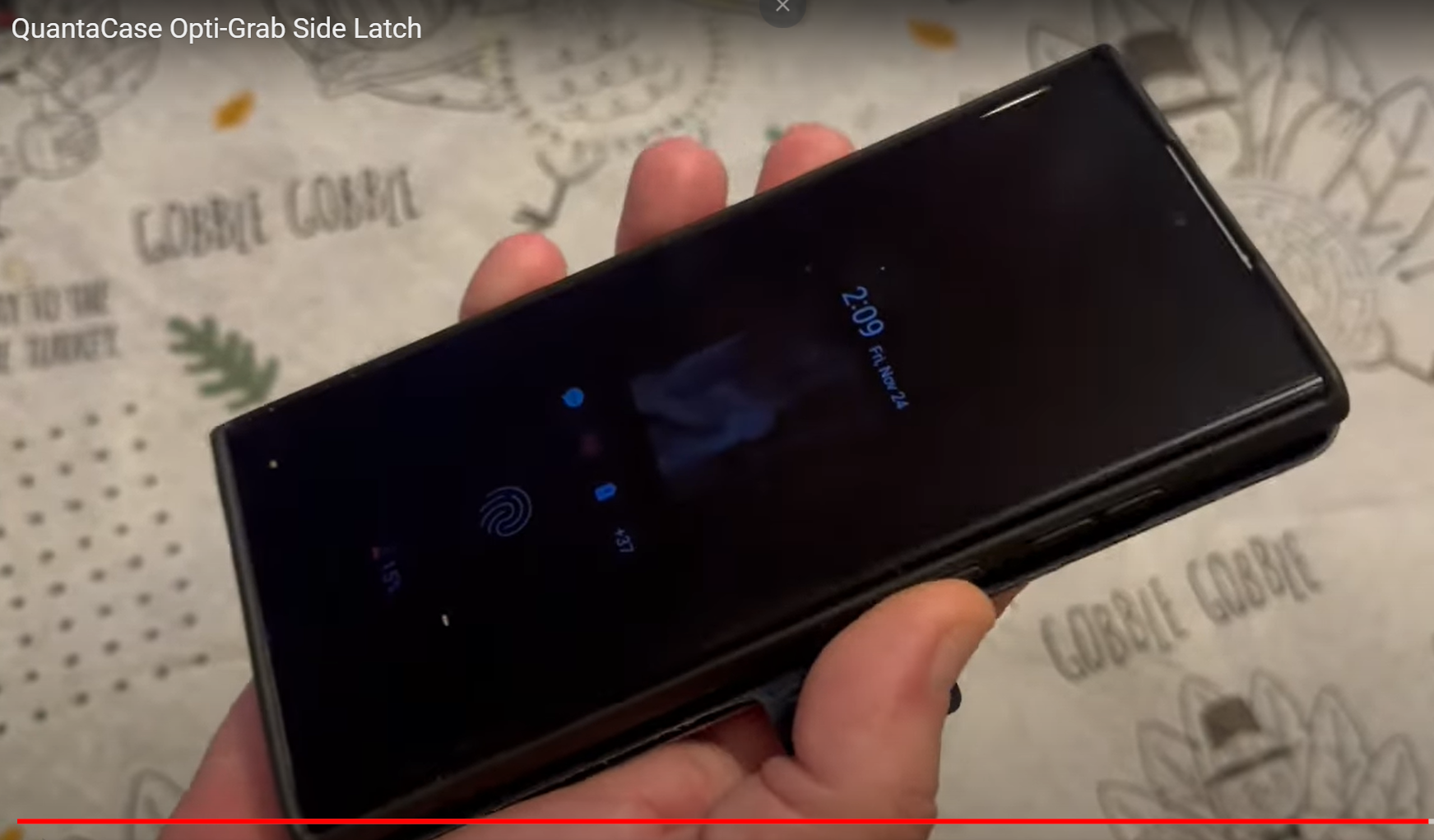Ultimate Guide to Cell Phone Radiation Shields Approved By RF Safe
The Ultimate Guide to Cell Phone Radiation Shields
For decades, RF Safe has been at the forefront of cell phone radiation protection, striving to educate consumers and remove dangerous products from the market. As the founder of RF Safe, I’ve seen firsthand the impact of misleading marketing and inadequate products. In this comprehensive guide, we will explore why RF Safe’s QuantaCase is the top choice for genuine radiation protection, and how you can make informed decisions to safeguard your health. This guide is optimized to provide the best info for “cell phone radiation shields” to ensure it helps you understand what works and what doesn’t!
Understanding Cell Phone Radiation
Cell phones emit radiofrequency (RF) radiation, a form of non-ionizing electromagnetic radiation. While the long-term health effects are still being studied, there is significant evidence suggesting that prolonged exposure to RF radiation can increase the risk of health issues, including cancer.
The Market Flooded with Ineffective Cell Phone Radiation Shields
The market is replete with so-called “anti-radiation” phone cases, many of which fail to deliver on their promises. Notably, brands like SafeSleeve and DefenderShield claim to offer protection but incorporate design flaws that can actually increase radiation exposure. These include detachable designs, metal loops, and unshielded speaker holes that interfere with the phone’s antenna and cause it to emit more radiation.
The RF Safe QuantaCase: The Only Genuine Cell Phone Radiation Shield
Feature Comparison: QuantaCase vs SafeSleeve vs DefenderShield
| Feature | QuantaCase | SafeSleeve | DefenderShield |
|---|---|---|---|
| Detachable Design | No antenna disruption | Yes, disrupts antenna | Yes, disrupts antenna |
| Metal Loops | No antenna disruption | Yes, disrupts antenna | Yes, disrupts antenna |
| Shielded Speaker Holes | Yes, solid barrier | No solid barrier | No solid barrier |
| Ultra-Thin Design | Yes, purposefully thin for optimal signal | No, bulky in comparison | No, bulky in comparison |
| Discourages Improper Use | Yes, designed without extended wallet features | No, includes wallet features | No, includes wallet features |
| Single RFID-Blocking Slot | Yes, ensures proper shield alignment and ease of use | No, multiple slots, can hinder proper use | No, multiple slots, can hinder proper use |
| Built-in KickStand | Yes, for safe distance viewing | Yes | Yes |
| Proper Use Education | Yes, guides users on optimal usage | No | No |
| Comprehensive Radiation Protection | Yes, scientifically designed for effectiveness | No, compromises on key aspects of safety | No, compromises on key aspects of safety |
Why QuantaCase is the Best Cell Phone Radiation Shield
1. No Detachable Design: QuantaCase avoids detachable designs that disrupt the phone’s antenna, ensuring no increase in radiation output.
2. No Metal Loops: Metal loops can alter radiation patterns and compromise safety. QuantaCase excludes these to maintain optimal protection.
3. Shielded Speaker Holes: QuantaCase includes shielded speaker holes, crucial for blocking high-frequency radiation, especially in the 5G spectrum.
4. Ultra-Thin Design: QuantaCase is the thinnest anti-radiation case on the market, designed to prevent the phone from increasing its radiation output while maintaining signal strength.
5. Discourages Improper Use: With only one RFID-blocking slot, QuantaCase ensures proper shield alignment and discourages using the case as a wallet, promoting better radiation protection.
6. Built-in KickStand: The built-in kickstand allows for safe distance viewing during data-intensive tasks, helping reduce radiation exposure.
7. Proper Use Education: RF Safe provides clear guidance on the proper use of the QuantaCase to maximize radiation protection.

The Science Behind QuantaCase
RF Safe’s QuantaCase is grounded in over 25 years of experience and scientific principles. It’s meticulously designed to minimize radiation exposure, leveraging advanced materials and design techniques.
Specific Absorption Rate (SAR) Increase and High-Impact Carbon Fiber Design Cases
The Specific Absorption Rate (SAR) measures the rate of RF energy absorption by the body from a cell phone. Research indicates that some cell phone cases, particularly those made of high-impact materials like carbon fiber, can increase SAR by up to 70%. This happens when a case interferes with the phone’s antenna, causing it to emit more radiation.
The Mistake of Using Wallet Features

Convenience often comes at the cost of safety. Using anti-radiation cases with multiple slots for cards and money can discourage proper use, leading to increased radiation exposure. When using an anti-radiation case with extended wallet features, users are not likely to properly utilize the front cover shielding by flipping their wallet inside out to use the speakerphone or texting option with hand protection.
QuantaCase is designed without extended wallet features to ensure users flip the cover inside out during speakerphone use, maximizing protection. The single card slot allows the front cover to be flipped around to the back of the phone between your hand and device. As you can see from the below image you can hardly tell you are using a flip cover case.

The Importance of Being RF Safe
Given the classification of cell phone radiation as a Class 2B Carcinogen by the IARC and various studies indicating health risks, it’s crucial to stay informed and make responsible choices. QuantaCase provides a way to minimize radiation exposure in most wireless scenarios.
Be RF Safe to Be Sure
Choosing the right cell phone case is not just about protecting the device; it’s about safeguarding your health. RF Safe’s QuantaCase stands out as a scientifically informed, meticulously designed option for those concerned about radiation exposure. Stay informed, stay protected, and trust in the power of physics to guide your choices. Be RF Safe to be sure.
Call to Action
Join the movement for safer technology. Educate yourself, choose genuine protection, and let’s collectively demand the change we need for a safer future.
Frequently Asked Questions about Cell Phone Radiation Shields
What is a cell phone radiation shield? A cell phone radiation shield is a device or case designed to reduce the amount of radiation emitted from a cell phone. These shields aim to minimize exposure to radiofrequency (RF) radiation.
How does QuantaCase differ from other cell phone radiation shields? QuantaCase is designed without metal loops or detachable parts that can disrupt the phone’s antenna. It includes shielded speaker holes and a single RFID-blocking slot to ensure proper use and effective radiation protection.
Why is the QuantaCase so thin? The QuantaCase is purposefully thin to prevent the phone from increasing its radiation output. Thicker cases can cause the phone to work harder to maintain a signal, resulting in higher radiation emissions.
Can cell phone cases increase radiation exposure? Yes, some cell phone cases can increase radiation exposure by interfering with the phone’s antenna, causing it to emit more radiation to maintain connectivity. This is why it’s important to choose a case designed to minimize this effect.
What is SAR and why is it important? Specific Absorption Rate (SAR) measures the rate of RF energy absorption by the body from a cell phone. Lower SAR values indicate lesser radiation exposure, making it a crucial factor in evaluating cell phone safety.
How to Identify Genuine Cell Phone Radiation Shields
Beware of Metal Loops: Metal components can alter radiation patterns and obstruct the phone’s antenna, increasing radiation output. Avoid Detachable Designs with Magnets: These designs can lead to blocked signals, prompting the phone to ramp up its radiation output. Question Unrealistic Protection Claims: Claims of “99% protection” are misleading. Effective protection is about more than just high percentage claims; it’s about practical, everyday safety. Look for Shielded Speaker Holes: Unshielded speaker holes can allow radiation to pass through, compromising the case’s effectiveness.
Final Words
The journey to finding the best cell phone radiation shield can be daunting, but it’s crucial for your health. Trust in the expertise of RF Safe and the scientifically backed design of QuantaCase to provide you with the protection you need. Share this knowledge, stay informed, and make choices that prioritize your well-being. Be RF Safe to be sure.
Cell Phone Radiation Shields RF Safe Does Not Approve Of
In the quest to minimize exposure to cell phone radiation, many products have flooded the market, promising miraculous protection. However, not all these products are effective or even safe. RF Safe is committed to educating consumers about the dangers of ineffective and misleading radiation shields. This section will highlight the types of cell phone radiation shields that RF Safe does not approve of, including pendants, stickers, and magic rocks claiming to provide protection.
Other Types of Ineffective Cell Phone Radiation Shields
1. Radiation Protection Pendants
Radiation protection pendants are often marketed as wearable devices that can shield the user from electromagnetic radiation. These pendants are typically made of materials claimed to have radiation-blocking properties. However, there is no scientific evidence supporting the effectiveness of these pendants in reducing radiation exposure. They do not alter the radiation emissions from your phone or other devices and are essentially useless in providing any real protection.
2. Radiation Protection Stickers
Radiation protection stickers are small adhesives that are supposed to be placed on your phone or other electronic devices. Manufacturers claim that these stickers can absorb or block harmful radiation. However, the Federal Trade Commission (FTC) has repeatedly warned consumers about these products, stating that there is no scientific proof that these stickers significantly reduce radiation exposure. In fact, some stickers can even interfere with the phone’s signal, causing it to emit more radiation to maintain connectivity.
3. Magic Rocks and Crystals
Some products on the market claim that certain rocks or crystals can protect against cell phone radiation. These “magic rocks” are often sold with the promise of balancing electromagnetic fields or providing a shield against radiation. There is no scientific evidence to support the claims of pendants and stickers.
The Good Housekeeping Investigation: A Case Study in Consumer Protection
In the early 2000s, Good Housekeeping Magazine conducted an investigative report on cell phone radiation shields. This investigation was sparked by an interview with RF Safe’s founder, John Coates. The results were eye-opening and led to significant legal actions.
The FTC’s Legal Actions
The Federal Trade Commission (FTC) charged two companies, Stock Value 1, Inc., and Comstar Communications, Inc., with making false and unsubstantiated claims about their radiation protection products. These companies marketed devices that purportedly blocked up to 99% of radiation emitted by cell phones, but they lacked any scientific evidence to back these claims.
Stock Value 1, Inc. Stock Value 1 marketed products like “SafeTShield™” and “NoDanger,” claiming they could block electromagnetic waves emitted from cell phones. However, independent tests conducted by the Good Housekeeping Institute found that these products did not reduce radiation exposure from cellular telephones.
Comstar Communications, Inc. Comstar marketed products under the names “WaveShield,” “WaveShield 1000,” and “WaveShield 2000,” claiming they could block up to 99% of harmful electromagnetic radiation. These claims were also found to be false, as the vast majority of electromagnetic energy emitted by cell phones comes from the antenna and parts of the phone other than the earpiece.
The FTC’s legal actions resulted in permanent injunctions, consumer redress, and other equitable relief, highlighting the importance of relying on scientifically backed products for radiation protection.
FTC Consumer Alert: Radiation Shields That “Cell” Consumers Short
Following the investigation, the FTC issued a consumer alert titled “Radiation Shields: Do They ‘Cell’ Consumers Short?” This alert offers practical advice for consumers looking to limit their exposure to electromagnetic emissions from their phones:
- Limit cell phone use to short conversations.
- Increase the distance between the antenna and the head by using a hands-free set or a car phone with the antenna outside the car.
- Avoid using cell phones where the signal is poor.
The alert encourages consumers to be vigilant about the products they choose.
RF Safe Does Not Support Ineffective Phone Radiation Shields
At RF Safe, our mission is to provide scientifically backed, effective solutions for reducing radiation exposure. Products like pendants, stickers, and magic rocks distract consumers from the real methods of protection and give a false sense of security. Our commitment is to ensure that consumers are educated about the best practices for minimizing radiation exposure and that they have access to products that truly work to protect the phone while keeping radiation exposure to its lowest possible level, like the RF Safe QuantaCase.
Stay Informed and Choose Wisely
When it comes to protecting yourself from cell phone radiation, it’s crucial to rely on products and methods that are backed by science. RF Safe’s QuantaCase is designed with your safety in mind, avoiding gimmicks and focusing on proven techniques to reduce radiation exposure. Be wary of products that make unsubstantiated claims and always seek out reliable information. Your health is worth the investment in genuine protection.
Join the movement for safer technology. Educate yourself, choose genuine protection, and help spread the word about the importance of scientifically backed cell phone radiation shields. Be RF Safe to be sure.







